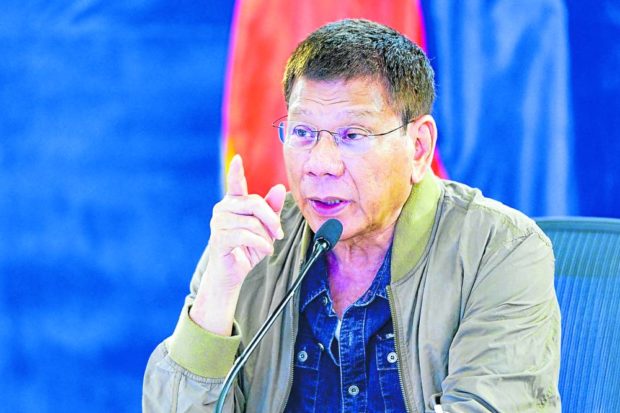Duterte in isolation after exposure

President Rodrigo Duterte —MALACAÑANG PHOTO
Although he is in quarantine after being exposed to a COVID-19-positive member of his household, President Duterte continues to carry out his duties, presidential spokesperson Karlo Nograles reported on Thursday.
“The President has since been tested for COVID-19, and while the results of the test came back negative, he is currently observing mandatory quarantine protocols,” Nograles said in a statement.
He added that Duterte was exposed to the COVID-19-positive member of his household staff on Jan. 30. But the President tested negative in a reverse transcription-polymerase chain reaction (RT-PCR) test on Monday and in a second one the next day.
“The Chief Executive continues to work while in quarantine, and is in constant communication with the members of the Cabinet in order to ensure that urgent matters are addressed and to monitor the implementation of his directives, particularly with regard to the government’s COVID-19 response,” Nograles said.
He also confirmed that Duterte visited Cardinal Santos Medical Center in San Juan City “for his routine medical checkup only” and stressed that this was not a violation of quarantine protocols.
“Based on the assessment of the President’s physician, he was cleared to go and have his medical checkup,” Nograles said.
Based on the quarantine protocols released by the Department of Health (DOH), asymptomatic close contacts of COVID-19 positive patients should quarantine for at least five days from the date of their last exposure. They must also monitor themselves for possible symptoms for at least 14 days.
Duterte has received two doses of the Sinopharm vaccine, along with a booster shot.
COVID-19 case update
The DOH on Thursday reported 8,702 new COVID-19 cases, the third straight day the daily tally fell below 10,000, although the number was higher than Wednesday’s 7,661.
The tally did not include figures from five laboratories that failed to submit their data to the COVID-19 Document Repository System.
This time, Metro Manila was not among the Top 3 regions that registered the highest number of cases. Ranked first was Western Visayas with 1,039 new infections, followed by Central Visayas with 799, and Davao Region with 785.
Independent pandemic monitor OCTA Research noted that the National Capital Region (NCR) and Calabarzon region composed of Cavite, Laguna, Batangas, Rizal and Quezon provinces remained at “moderate risk” for COVID-19. Both registered negative one-week growth rates in new COVID-19 cases, according to OCTA fellow Guido David.
Citing indicators, he said the average daily attack rate (Adar) in Batangas, Quezon and Rizal provinces was now also “moderate.”
Adar refers to the number of individuals infected per 100,000 population. For OCTA Research, the acceptable attack rate is below 10.
Based on the group’s data, the Adar for Batangas was 9.56; Rizal, 9.55; and Quezon, 5.30.
But the Adar for NCR, as well as Cavite and Laguna, remained “high” at 17.83, 13.29 and 13.96, respectively.
The NCR and Calabarzon region showed a “very low” reproduction rate and “low” health-care utilization rate, according to OCTA.
However, the COVID-19 positivity rate was “very high” in Laguna at 26 percent and Batangas at 23 percent, it added.
The country’s positivity rate on Thursday, based on DOH data, was 25.5 percent, higher than the 24.8 percent recorded on Wednesday. This was based on 42,446 people tested on Tuesday.
The national caseload was now 3,585,461 with 8,463 or 97 percent of the new cases occurring from Jan. 21 to Feb. 3.
The DOH said there were 153,335 active cases. Of these, 143,493 were mild, 4,923 asymptomatic, 3,067 moderate, 1,528 severe, and 324 critical.
The 15,290 recoveries brought the total number of survivors to 3,377,958 while 71 fatalities raised the death toll to 54,168.The DOH said that 66 deaths occurred this month, while the rest happened between April and October last year but were reported only on Thursday.
gsg
For more news about the novel coronavirus click here.
What you need to know about Coronavirus.
For more information on COVID-19, call the DOH Hotline: (02) 86517800 local 1149/1150.
The Inquirer Foundation supports our healthcare frontliners and is still accepting cash donations to be deposited at Banco de Oro (BDO) current account #007960018860 or donate through PayMaya using this link.